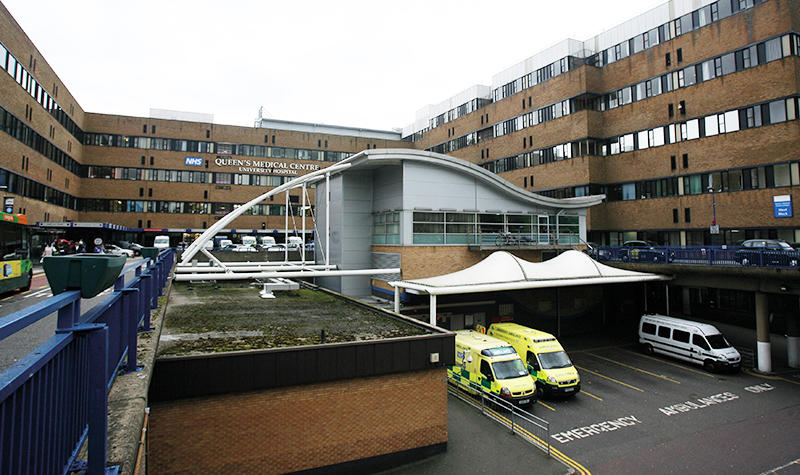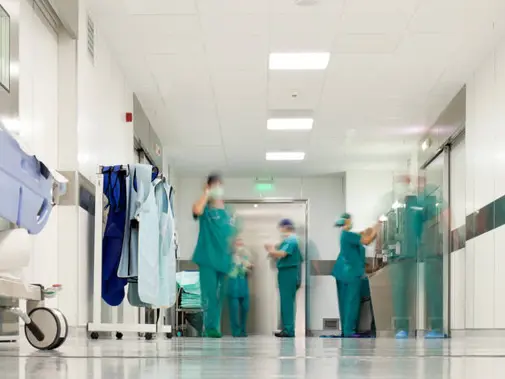 BICKNELL: 'Devastating' scenes
BICKNELL: 'Devastating' scenes
A doctor has spoken of his disbelief at the level of pressure facing the NHS this winter, after ambulance crews with critically ill patients struggled to access a hospital emergency department.
Nottingham GP Marcus Bicknell said he felt the NHS was at a ‘devastating crisis point’ after describing scenes at Nottingham’s Queen’s Medical Centre on Tuesday in which dozens of ambulances were left queued outside with crews struggling to access the emergency department.
Dr Bicknell, who is also chair of the association’s forensic and secure environments committee, explained how a professional colleague with whom he works had witnessed the unprecedented backlog while escorting a patient to hospital.
Arriving at the hospital, Dr Bicknell said his colleague, who wishes to remain anonymous, saw roughly 40 ambulances queuing to access the emergency department, with one crew of paramedics forced to perform CPR on a patient as they transported them on a trolley.
‘My colleague described it as Armageddon,’ he said.
‘The whole of the road was just blocked by ambulances with no access to the resus bay and a trolley being rushed down the road by five paramedics with a sixth paramedic performing heart massage on a patient.
‘I’ve trained and worked in the NHS for 38 years and obviously patients are resuscitated in ambulances, but I’ve never known a scenario where you can’t actually get an ambulance to the hospital door, because the system is so choked with patients.
‘That’s what we’re facing [in the NHS],’ said Dr Bicknell.
‘We have reached a crisis point, which is just devastating. We don’t have enough hospital beds, we have a staffing crisis [and] we don’t have staff deployed in the right places. A decade of disinvestment has left us with insufficient beds and insufficient staff such that people are unable to get into the hospital.’
Hours to wait
NHS England weekly SitRep data for the week ending 11 December meanwhile reveals that around 12,500 ambulances were forced to wait more than an hour in queues outside emergency departments in England.
Data released in October by AACE (Association of Ambulance Chief Executives), which oversees the 10 regional ambulance services in England, reveals the average patient handover time in October came to more than 42 minutes, double what it had been in October 2020.
In its report, the AACE estimates around 44,000 patients in England experienced potential harm owing to handover delays during October.
 Queen’s Medical Centre, Nottingham
Queen’s Medical Centre, Nottingham
Nottingham University Hospitals NHS Trust medical director Keith Girling apologised for the delays warning recent weeks had seen increased pressure on emergency care services.
He said: ‘We work very hard to minimise ambulance handover delays because we believe that vulnerable patients are safer in our care rather than waiting in the community for an ambulance.
‘In the last few weeks we have seen further increases in pressure on the emergency care pathway and this has led to some times when ambulance crews have been waiting to hand over patients.
‘We apologise for these delays and will continue to work closely with the East Midlands Ambulance Service to transfer patients into the care of the emergency department as quickly as possible.’
Commonplace crisis
 BANFIELD: Unacceptable pressure
BANFIELD: Unacceptable pressure
BMA council chair Phil Banfield warned the incident in Nottingham was just one example of the pressures on all parts of the NHS, now at unprecedently dangerous and unacceptable levels and exacerbated by arrival of winter.
He urged the Government to recognise and accept radical action and investment was needed if the health service was to survive and meet the needs of its patients and staff.
He said: ‘This incident shows that the current level of pressure on our health service is intolerable.
‘We know from recent performance data of the incredible strain being experienced in all parts of the NHS and among those who staff it, and we know that this pressure is likely to grow as seasonal illness, COVID and the cost-of-living crisis continue to drive patient demand.
‘The Government can no longer choose to look the other way. It must start to listen to and engage meaningfully with those who staff the NHS and the people they care for, with commitment to real solutions to the staffing and resources crisis in our health service.’

